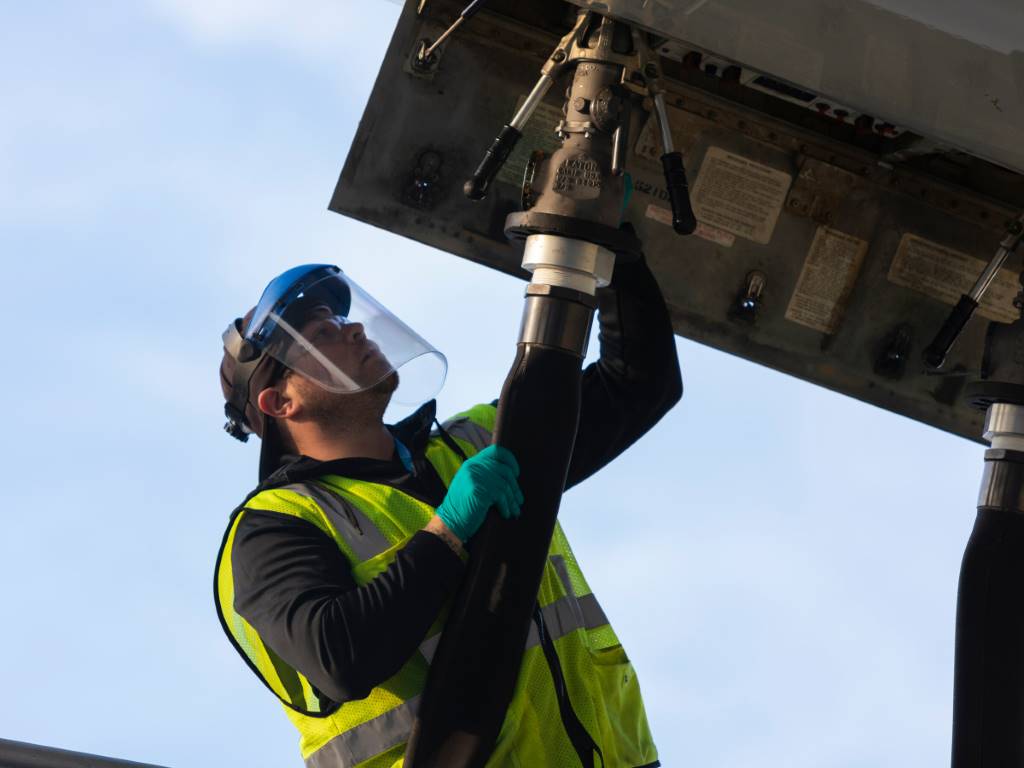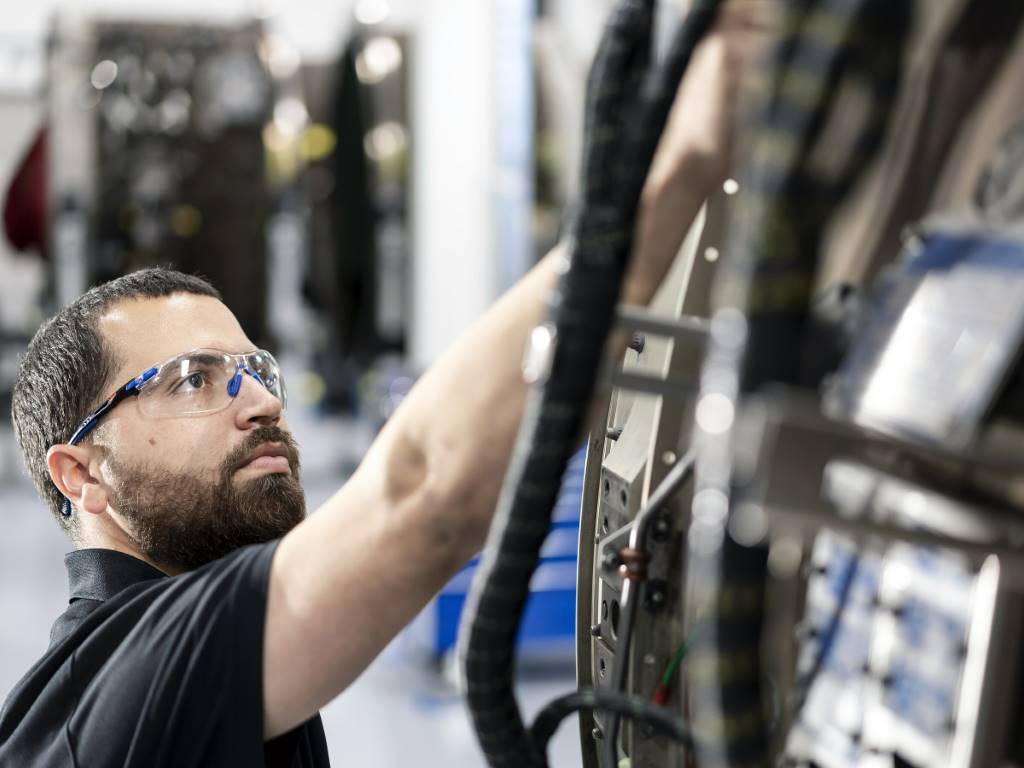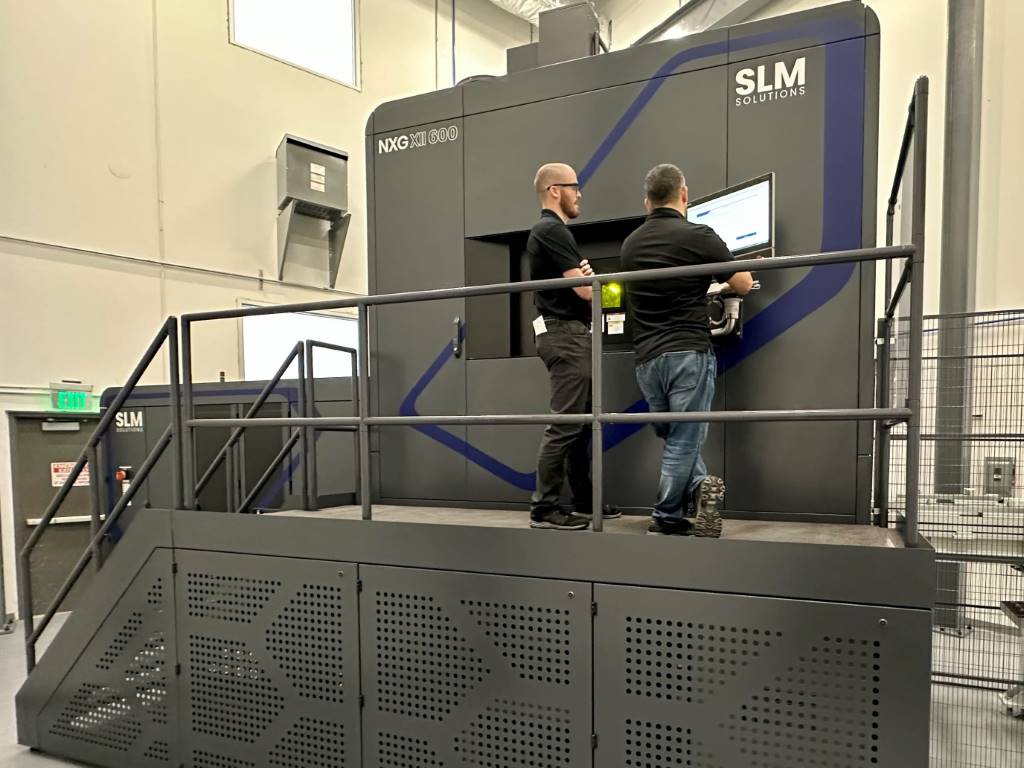High flying composite innovation

Aerospace Manufacturing previews some of the companies demonstrating their latest products and advances at this year’s JEC World 2020 held in Paris from March 3rd-5th.
We begin our round-up with Web Industries (hall 5, stand G21) who will showcase its precision composite materials formatting capabilities ranging from slitting and spooling to ply cutting and kitting, along with services available from its newest acquisition, France-based Omega Systèmes.
With innovative PrecisionSlit cutting technology, Web Industries slits, spools and winds prepreg composite tapes as narrow as 3.2mm while holding aerospace tolerances. By matching tape length, winding patterns, liner materials, and spool sizes to customers’ specific fabrication requirements, Web provides custom-formatted material that streamlines workflow, increases production rates and reduces overall waste.
Web’s automated ply cutting and kitting services provide proven, cost-effective outsourced composite, specialty fabric and film formatting.
Services include nesting ply shapes to maximise yields and minimise waste from high-value materials. Exclusive PlyScan technology labels and sequences precision-cut plies, providing aerospace-grade quality assurance that every pre-assembled kit is ready to go from Web’s inventory to the factory floor, ready for final production. When combined with expert material and management solutions, Web Industries’ customers benefit from a streamlined supply chain, simplified cost modelling and reduced overheads.
With its 2019 acquisition of Omega Systèmes and its existing facility in Stade, Germany, Web now operates three European production plants.

Winners of the 2019 JEC Innovation Award Public Prize, Cecence returns to JEC 2020 having cemented its position as one of the ‘go to’ composite manufacturing solutions providers in the UK. Last year’s winning entry, for the first all composite aero seat back, combined a carbon fibre and phenolic system resulting in a lightweight, FST compliant component, which is Airbus line-fit approved and in-flight with a national flag carrier’s fleet.
Cecence has now taken its expertise in composite material development to look at how to develop similar components using sustainable rapid process materials.
A NATEP funded programme in 2019 supported a project to develop a carbon/glass fibre and bio resin-based system and produced extremely positive results. With the aerospace industry needing to drastically reduce its carbon footprint, one potential solution is to look at the sustainability of the interior components. 2020 sees the company extend its sustainable and renewable focus to natural fibres such as hemp and flax, and where additional structure is required, to the use of recycled carbon fibre over virgin cloth, combined with bio-based resin systems that are able to meet aero interiors stringent FST requirements. The company has been shortlisted for another JEC Innovation award again this year.
Moving on, Ascent Aerospace (hall 5, stand P6) is a globally-renowned, single-source provider of production and automated assembly systems for the aerospace and defence industry. As the largest tooling group in the industry, Ascent produces a full suite of both mould and assembly tooling required by the market, including the largest Invar moulds ever made for aerospace. As an automation provider and production system integrator, Ascent works with customers to develop their projects, from start to finish, ensuring it is an efficient and cost-effective solution.
As experts in all primary tooling materials – Invar, carbon fibre, epoxy, foam, steel, aluminium – Ascent can be relied on for independent advice on what to use for any application. Ascent Aerospace designs and builds layup moulds, bond jigs, trim and drill fixtures, mandrels and other tooling for composite aerostructures: wings, fuselages, nacelles, helicopter cabins/blades, launchers, payload fairings, spars, stringers and frames.
At JEC World 2020, Ascent will have its patented HyVarC demo tool: a Hybrid Invar/composite layup mould. This innovative product capitalises on the desirable performance characteristics of Invar and composites, to offer an ideal layup mould for aerospace applications.
In hall 6, Coriolis Composites and MF Tech (hall 6, stand D37 and D41) will share with visitors their experience of automated fibre placement machines (Coriolis C1, C2, Csolo and C5), software solutions (CATFiber and CADFiber), composite engineering department (feasibility studies, manufacturing operation and programming) and customer service (training, technical support, maintenance and spare parts).
On the stand, the company will show real carbon parts, demonstrating its experience and knowledge in complex and intelligent lightweight manufacturing for the aerospace, automotive and yachting markets, with the technical team available to answer questions in high performance fibre placement technology.
MF Tech, is active in three main fields: the design of robotic filament winding machines; prototyping of filament winding parts and manufacture of tubes made of composite materials using filament winding. For many years MF Tech has established its place as one of the new major manufacturers of filament winding machines, and the only one using robotics.
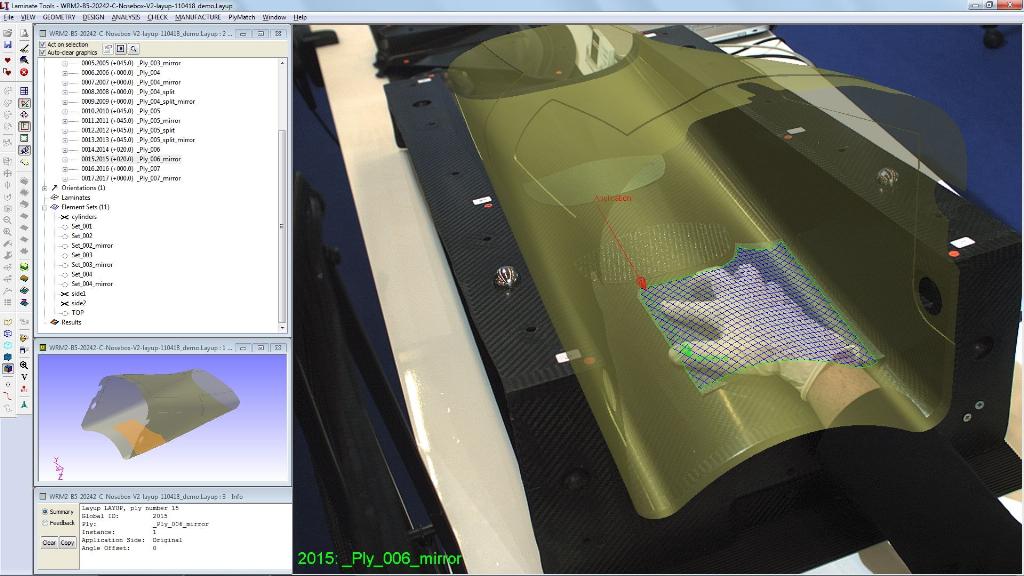
Elsewhere, Anaglyph (hall 5, stand N80), the UK composites design and manufacturing solutions specialist, will demonstrate the latest version of its hand-layup ply placement technology PlyMatch. PlyMatch uses augmented reality to show the live combined images of actual and target ply outlines and fibre orientation details on a monitor, so that the two can be matched by the operator. PlyMatch is used for the accurate placement of plies in hand lay-up manufacture of composite parts, as well as for monitoring and validation of automated methods. It is particularly useful in case of complex geometries, with high curvature or enclosed spaces. PlyMatch is used by manufacturers in the aerospace, automotive, bicycle and transport sectors.
Airtech (hall 5, stand E32) will introduce its new large-scale additive manufacturing capabilities along with newly formulated resins for low and high temperature printing. Airtech’s new Print-tech, full-service tooling manufacturing solution, leverages 45 years of polymer extrusion and manufacturing expertise to address the needs of the large-scale thermoplastic composite 3D printed tooling industry.
The high throughput and relative low-cost manufacturing method of fused deposition modelling (FDM) is used to create large tooling structures and surfaces for low to high temperature lay-up moulds, trim or assembly fixtures, or masters. These demanding tooling applications require the structures and the materials they are made from to be durable and dimensionally stable.
Airtech has also developed a new series of innovative polymer composite resins, Dahltram, for use in large scale 3D printing that has addressed the need for lower CTE and a more robust service life when used at low or high temperatures, including use in an autoclave.
During JEC, Huntsman (hall 6, stand M31) will display new applications using Araldite, Epibond, Epocast, and Miralon branded products. These will include components for formulators, resin systems for composite production, structural adhesives, and void-fillers, as well as CNT-based carbon materials.
As an industry first, formulators will be introduced to Araldite MT40050, a new epoxy building block with intrinsic FST and heat-release properties, as well as thermo-mechanical and processing capabilities similar to standard epoxy resins.
Huntsman will also demonstrate its recent qualification of Araldite FST 40002/40006, a ready-to-use solution for manufacturing interior parts via infusion, RTM, compression moulding or pultrusion. Additionally, a door-frame element will also be on display, made via High-Pressure RTM with new FAF chemistry, which helps formulators improve productivity by reducing mould occupation time.
Additionally, Huntsman will unveil a new electrically conductive Miralon modified adhesive and demonstrate CNT-based Miralon sheets that can be embedded in composite structures as heat-generators, using very low voltage.
Fastening specialist, bigHead (hall 5, stand Q70) is launching its latest innovation, Core Range, at this year’s JEC World.
When working in composites, engineers find it hard to predict how a fastener will perform under load. Without any industry standards, the answers to critical questions, such as ‘how much load can a bonded or embedded fastener withstand’ or, ‘how will it fail’ come down to guesswork and time-consuming trials and tests. bigHead’s Core Range now provides engineers with the key information to answer these questions and streamline their design process.
As the behaviour of composite joints are so hard to predict, bigHead’s design rules help engineers avoid costly surprises later on in the process.
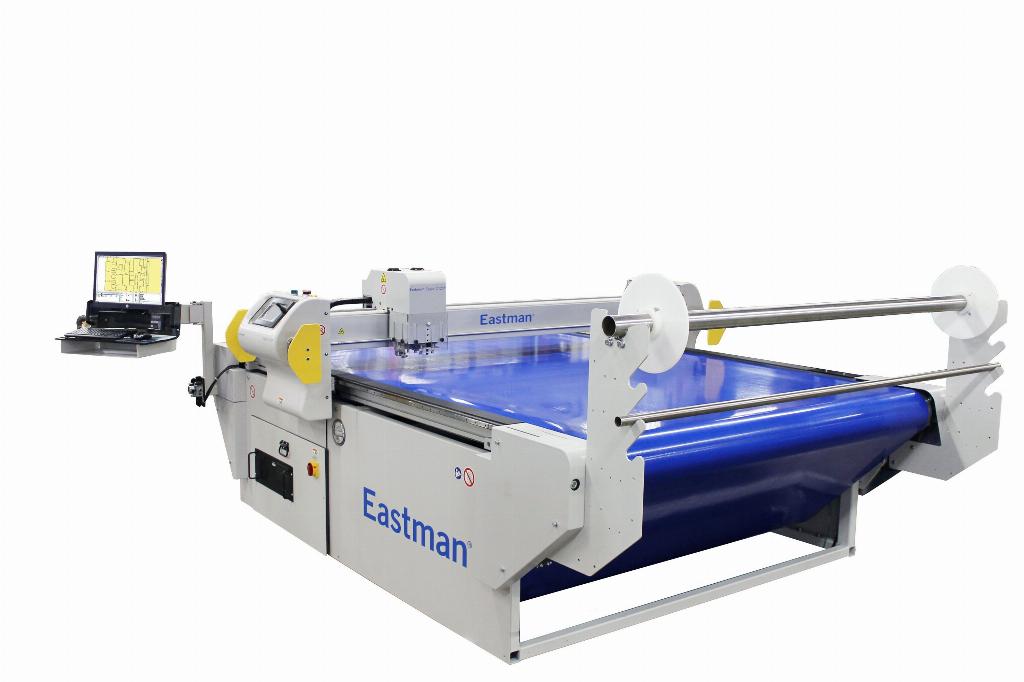
Meanwhile, the Eastman Machine Company (hall 6, stand D59) will be demonstrating its latest Eagle C125 conveyor cutting system in Paris. The system minimises overall factory space required but maintains complete cutting automation for industrial cutting applications.
The Eagle C125 conveyor is a CNC ply-cutting system engineered for single- to low-ply automatic cutting of flexible fabrics; composite reinforcements like fiberglass, carbon and aramid; industrial fabrics and insulations as well as traditional textiles. It has the ability to continuously convey rolled material goods with consistent speed and control.
The cutting system requires minimal operator guidance to automatically feed and spread material to the identified start position. The conveyor system is available in nearly a dozen different widths from 60 inches to over 14ft wide and several lengths.
The C125 conveyor system is an ideal choice for companies who need to cut long parts, require continuous conveying or simply want to minimise the material handling commonly associated with a static table cutting system. It features cutting speeds up to 152cm/second.
CCP Gransden will have a full-scale demonstrator focused on aerospace applications at the show. Specialised ‘single-stage overmoulding’ is applied, combining the thermoforming of aerospace grade pre-consolidated laminates with injection moulding compound in a fully automated cell. This utilises a net formed carbon-fibre/PEEK composite laminate featuring gentle double curvature. Injection moulding is used to successfully create stiffening elements to enhance directional rigidity and seal the edge of the laminate. Furthermore, weight savings are possible through structural optimisation taking advantage of new design freedoms; ribs and joints can be constructed using injection moulded features, potentially reducing the dependence on thicker laminate sections.
The demonstrator component on display will show a solution to enhance manufacturing of access panels on aircraft wings, with a cycle time of just 3 mins. Existing processes to manufacture such aerostructures typically involve the manual fabrication and slow autoclave cycling of thermoset composites requiring considerable infrastructure to respond to the growing rate demand of commercial aircraft. With this fully automated and optimised single stage overmoulding process over 220,000 components can be manufactured annually with full traceability.
Bitrez (hall 6, stand S66) a leading manufacturer of specialist polymers and chemicals, is launching a new family of regulatory compliant bio-based resins for the composites industry at the show.
The new family of Bio-based resins, including bio-Epoxy systems and PFA (Polyfurfuryl Alcohol), are designed especially for composite applications and are REACH (registration, evaluation, authorisation and restriction of chemicals) compliant.
PFA is a thermosetting bio-resin derived from biomass crop waste with similar qualities to a Phenolic resin but with lower VOC emissions. In addition to its environmental credentials, PFA has fire retardant properties equivalent to Phenolic, plus excellent temperature and chemical resistance.
Next up is composites and advanced materials precision slitting company, Bindatex (hall 6, stand S52) who will use JEC World to announce it has cut 300kg of prepreg and started work on its 14th order in two years for a large composite materials OEM supplying thermosets and thermoplastics.
In its latest order, Bindatex are slitting thermoset prepreg composite down to 3.175mm for automated fibre placement (AFP) applications. The Manchester-based company, which has been cutting composites for over 15 years, are the only company in the UK which can undertake precision slitting to widths as low as 1mm. The narrow width poses a challenge for composite cutting.
Instron (hall 6, stand N91) supplies a range of static, dynamic, and impact testing equipment to perform composite testing to all of the relevant ISO, ASTM and EN standards, as well as meeting the appropriate Nadcap requirements. These systems combine high performance with flexibility, allowing users to easily swap between test types and configurations. All of the systems are controlled by powerful, easy-to-use software, which include test libraries pre-loaded with the most popular testing standards. Visit the Instron stand to see examples of testing systems, accessories, and software for the testing of composites.
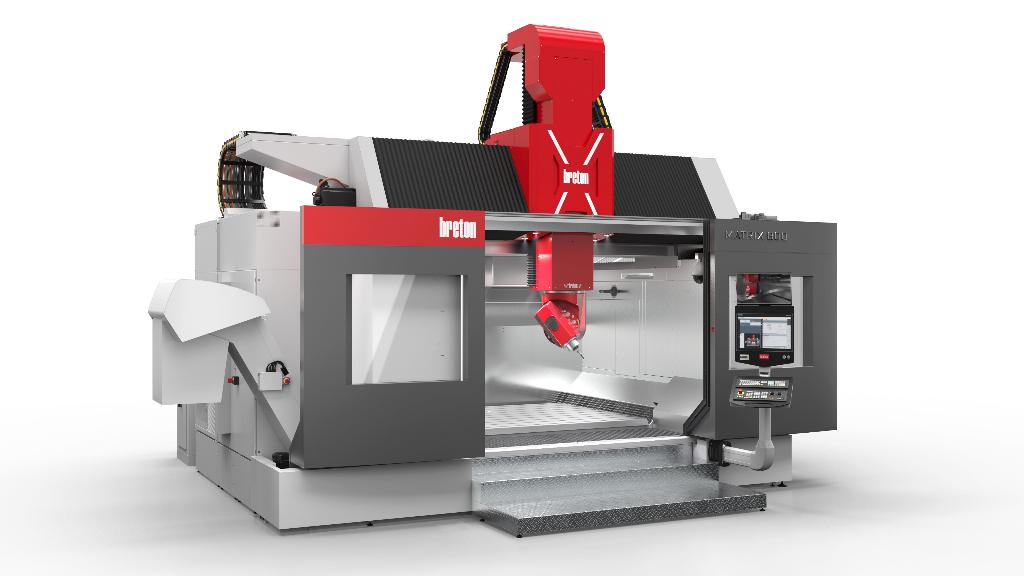
Breton’s (hall 6, stand D34) latest generation Matrix 800 is a high dynamic multi-tasking 5-axis machining centre, featuring travels of 2,000 x 2,500 x 800mm and is the right choice for those composites machining applications that require high productivity combined with utmost precision. The robust monoblock machine design allows for high dynamics to be exploited with superior and dependable accuracy.
Matrix 800 features a range of dedicated solutions which make the machine to fit perfectly for all types of machining processes, whether the cutting it is dry, wet or a combination of the two. Efficient dust extraction and filtration system can be supplied for all the dry machining purposes. This includes a spindle-mounted extraction hood which can be automatically adjusted in position, a series of perimeter dust extraction intake ports embedded in the machine structure and a wide range of ATEX compliant filtration units.
When applications call for wet cutting, the machine is delivering high-pressure coolant trough the tool and on peripheral spindle nozzles. Through dedicated conveying chutes, the coolant is recovered on special separation systems which are precisely tuned to provide the right filtration for any material.
As with all Breton machines for composites, the Matrix 800 features a special protection for drives, head and spindles through specific seals and pressurisations that, since always, have distinguished our machines as a byword of their reliability and consistency over time.
This new Matrix 800 is engineered to support Breton’s proprietary technologies, such as Accusink (Automated accuracy control on Countersink machining), Accuthick (Contactless ultrasonic thickness inspection) and core cutting via ultrasonic blades or knives.

Evonik (hall 5A, stand J40) will present Rohacell foam core for aerospace at the show. Rohacell foam is setting new milestones for structural foam cores in aviation and aerospace applications. Even more impressive, it is ideal for use in the growing area of automated production of sandwich design CFRP composites. This versatile high-performance foam core material solution is providing the aerospace industry with increased opportunities in efficiency, both time and cost savings, over conventional classic methods of using hollow structures or honeycomb designs.
Visitors to Evonik’s stand can learn more about use of the rigid foam material in automated production, as well as explore current applications of Rohacell in sandwich design composite structures. A partial composite helicopter main rotor blade produced by Van Horn Aviation for the 206B JetRanger helicopter will be on display. The blade was fabricated with a Rohacell 71HERO foam core and Toray carbon fibre, then autoclave co-cured. Cutaway sections on the blade enable visitors to view interior construction. Also, on display is the core of a section of an aircraft wing demonstrator featuring puzzle-joint connection design, from Pronat Aerospace.
Aro PR and Marketing (hall 6, stand S52), specialists in raising the profile of engineering, scientific and composites companies, will be showcasing its reputation-building services at JEC. The award-winning agency has successfully developed strong relationships with editors and publishers within Europe and globally.
The publications Aro works with are specialists within a variety of industries, including composites, aerospace, automotive, medical, energy and transport. These cover technical, national, regional and local media as well as all social media channels.
The Aro team will be available at the show to talk you through its media relations services as well as your other PR and marketing needs; from awards applications and social media to copy writing and web design and SEO.
Lastly, Von Roll (hall 6, stand E5) core fillers are used for local reinforcements in aircraft interiors. They are filled in the honeycomb core where inserts like seats need to be fixed to the floor panel.
Manufacturers make extensive use of the material, using manual potting operations, due to difficulties in filling specific target areas or single cells automatically. Due to its extreme low viscosity, for the first time ever, precise, homogenous and reliable filling even of a single honeycomb cell of a size down to 3mm is possible with Von Roll’s NEXT GEN core filler, in both manual and automated production.
The new filler means users need to buy less material and can avoid scrap production: the automation process can cut production costs by more than 30% and 20% of material savings can be achieved. Long pot and storage life (up to 5 weeks) at ambient conditions and an expansion coefficient near 0 under the influence of heat or load make it the material of choice when it comes to structural fixations and it offers significant advantages for weight reductions. The core filler is compatible with all kinds of curing processes and compliant with FST regulations.




